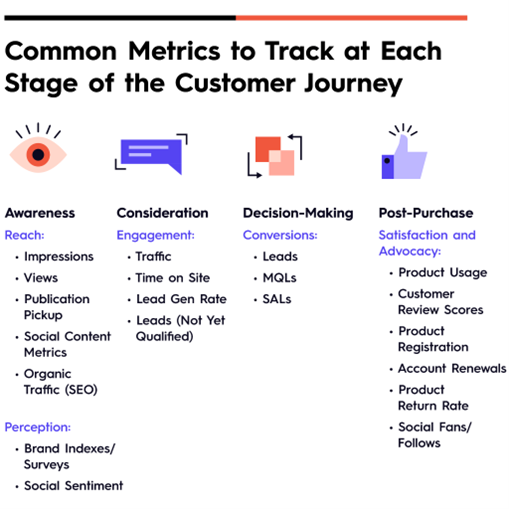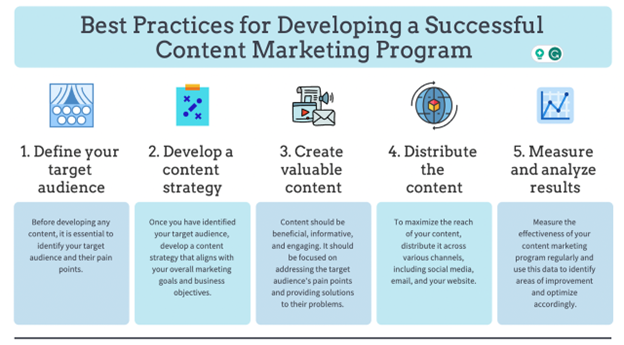SHARE

In today’s digital landscape, content marketing has become indispensable for businesses looking to establish their online presence and engage their target audience. But how can you be sure that your content marketing efforts yield the desired results? The answer lies in tracking and measuring your content marketing performance. By effectively monitoring your metrics, you gain valuable insights that can help you refine your strategy, optimise your campaigns, and drive tangible business outcomes. In this article, we will explore the importance of tracking content marketing results and provide you with actionable tips on measuring your success successfully.
Understanding the Importance of Tracking Content Marketing Results
Before we dive into the nitty-gritty of tracking content marketing results, let’s first explore why it’s crucial to monitor your performance. For any business, content marketing serves two key purposes: attracting and retaining customers. By tracking your content marketing efforts, you can assess whether your strategies are effectively achieving these goals. When it comes to content marketing, the landscape is constantly evolving. With the ever-increasing competition and changing consumer behaviours, staying on top of your game is essential.
Tracking your content marketing results allows you to adapt and refine your strategies, ensuring you deliver the right message to the right audience at the right time. Tracking content marketing results provides valuable insights into your target audience. By analysing user engagement metrics, you can understand what resonates with your audience and tailor your content accordingly. This helps attract new customers and builds long-term relationships with existing ones.
The Role of Analytics in Content Marketing
Analytics forms the backbone of tracking content marketing results. By leveraging analytics tools, you gain access to valuable data that paints a comprehensive picture of your content’s performance. From user engagement metrics to conversion rates, analytics empowers you to make data-driven decisions for your content marketing strategy. With the help of analytics, you can track the performance of individual pieces of content, such as blog posts, videos, or social media campaigns. This allows you to identify which types of content are resonating with your audience and which ones may need improvement by understanding what works and what doesn’t, you can optimise your content strategy for maximum impact.
Furthermore, analytics can provide insights into the effectiveness of different distribution channels. By tracking the source of your website traffic, you can determine which channels drive the most engagement and conversions. This information can help you allocate your resources effectively and focus on the channels that yield the best results.
Key Performance Indicators for Content Marketing
Key Performance Indicators (KPIs) are the yardstick by which you measure the success of your content marketing efforts. They provide you with measurable metrics that align with your business objectives. Some common KPIs for content marketing include website traffic, bounce rates, time on page, lead generation, and conversion rates. Website traffic is one of the most fundamental KPIs for content marketing. It indicates the number of visitors coming to your website and can help you gauge the overall reach of your website. By monitoring website traffic, you can identify trends and patterns, such as seasonal fluctuations or the impact of specific marketing campaigns.
Bounce rates, on the other hand, measure the percentage of visitors who leave your website after viewing only one page. A high bounce rate may indicate that your content needs to be more engaging or that it needs to meet the expectations set by your marketing efforts. By analysing bounce rates, you can identify areas for improvement and optimise your content to keep visitors engaged. Time on page is another important KPI that measures how long visitors spend on your website. This metric can help you assess the level of engagement your content is generating. A longer time on the page suggests that visitors find value in your content and are more likely to convert into leads or customers.
Lead generation and conversion rates are perhaps the most critical KPIs for content marketing. These metrics indicate the effectiveness of your content in driving desired actions, such as filling out a contact form or making a purchase. By tracking lead generation and conversion rates, you can evaluate the ROI of your content marketing efforts and make informed decisions about resource allocation. Tracking content marketing results is essential for businesses looking to maximise the impact of their content. By leveraging analytics and monitoring key performance indicators, you can gain valuable insights, optimise your strategies, and ultimately achieve your business objectives.
 (Source: https://www.columnfivemedia.com/how-to-use-metrics-in-your-content-strategy/ )
(Source: https://www.columnfivemedia.com/how-to-use-metrics-in-your-content-strategy/ )
Setting Up Your Content Marketing Tracking System
Now that we understand the importance of tracking content marketing results let’s delve into the practical steps to set up your tracking system. This involves choosing the right tools and implementing them effectively.
Choosing the Right Tools for Content Tracking
There is an array of tools available to track your content marketing performance. Each tool offers distinct advantages, from Google Analytics to social media analytics platforms. Assess your specific requirements and budget constraints to choose the tools that best suit your needs.
Setting Up Google Analytics for Content Marketing
Google Analytics is a powerful tool for tracking website performance, including content marketing efforts. Setting up goals and events in Google Analytics allows you to monitor key metrics such as traffic sources, user behaviour, and conversion rates. Ensure you have Google Analytics correctly integrated into your website to track and measure your content marketing success effectively.
How to Measure Content Marketing Success
Now that you have your tracking system, it’s time to explore how to interpret your content marketing data and measure success.
Interpreting Your Content Marketing Data
Data without interpretation is merely numbers and graphs. You need to analyse your content marketing data effectively to derive actionable insights from your content marketing data. Look for patterns, trends, and correlations that can help you identify what resonates with your audience and needs improvement.
The Role of Social Media Metrics in Content Marketing
Social media is pivotal in content distribution and engagement in today’s digital landscape. Utilising social media metrics such as reach, engagement, and shares can provide valuable insights into the effectiveness of your content marketing efforts on these platforms.
 (Source: https://www.linkedin.com/pulse/developing-content-marketing-program-scott-parker/)
(Source: https://www.linkedin.com/pulse/developing-content-marketing-program-scott-parker/)
Improving Your Content Marketing Strategy Based on Results
Your content marketing strategy should be a living, evolving entity that adapts based on your results. Let’s explore how you can make data-driven decisions and refine your strategy for better outcomes.
Making Data-Driven Decisions in Content Marketing
Your measurement data should drive your decision-making process. Analyse your metrics, identify areas for improvement, and experiment with different content formats, topics, and distribution channels. By making data-driven decisions, you can optimise your content marketing efforts and achieve better results.
Adapting Your Content Strategy for Better Results
As you gain insights into what is working and what isn’t, adapting your content strategy is essential. Focus on producing high-quality content that resonates with your target audience, aligns with their needs, and addresses their pain points. Regularly monitor your metrics and iterate on your strategy to improve your content marketing performance.
Common Pitfalls in Tracking Content Marketing Results
Although tracking content marketing results is vital, there are common pitfalls that businesses should be aware of to ensure accurate measurement and interpretation of their efforts.
Avoiding Common Mistakes in Content Marketing Analytics
From setting correct goals to failing to implement tracking codes correctly, several things can hinder your content marketing analytics. Educate yourself on best practices and seek professional guidance to avoid these common pitfalls.
Overcoming Challenges in Measuring Content Marketing Success
Measuring content marketing success can be challenging due to the complex nature of content’s impact on the buyer’s journey. Be prepared to face challenges such as attribution modelling, data integration, and aligning your metrics with business goals. Tackling these challenges head-on will lead to more accurate and meaningful measurement of your content marketing performance. Effective tracking and measurement of your content marketing results are vital for the success of your overall marketing strategy. By continuously monitoring your metrics, interpreting your data, and making data-driven decisions, you can refine your approach, optimise your campaigns, and achieve tangible business outcomes. So, unleash the power of tracking and measuring your content marketing performance today and unlock the true potential of your digital marketing efforts.
Frequently Asked Questions About Content Marketing Results
How Do I Measure the Effectiveness of my Content Marketing Efforts?
You can measure effectiveness by tracking key performance indicators (KPIs) related to your content goals. For example, if your goal is brand awareness, you might track website traffic and social media reach. If your goal is lead generation, you might track conversion rates and lead quality.
What are the Key Metrics To Track In Content Marketing?
Key metrics include website traffic, engagement metrics (such as time on page, bounce rate, and social shares), conversion rates, lead generation, customer retention, and ROI.
What Tools Can I Use To Track and Measure Content Marketing Performance?
Various tools are available, including Google Analytics for website traffic and user behaviour analysis, social media analytics tools for tracking social engagement, email marketing platforms for monitoring email campaign performance, and customer relationship management (CRM) systems for tracking leads and conversions.
How Often Should I Review and Analyse Content Marketing Metrics?
It’s recommended to review metrics regularly, at least monthly, to track trends over time and make timely adjustments to your content strategy. However, the frequency may vary based on your goals and resources.
What Should I Do If My Content Marketing Efforts Aren't Achieving The Desired Results?
If your content marketing efforts aren’t achieving the desired results, it’s crucial to analyse the data to identify areas for improvement. This may involve adjusting your content strategy, targeting different audience segments, experimenting with different content formats or distribution channels, or optimising your existing content for better performance. Regular testing and iteration are key to improving content marketing effectiveness.





